Buffalo Bills Face Ownership Questions

Timothy T. Ludwig-USA TODAY Sports
The ‘Bills in Toronto series’ has been underway for six years, seen four different head coaches and one win. I think that sums it up pretty well.
Now, after another loss at the Rogers Centre, the Bills head home to an uncertain future.
Who exactly is going to be the new owner when Ralph Wilson dies?
Granted that’s a fairly morbid thought, but it’s the Buffalo way. This isn’t a franchise that gets sold while he’s alive. This is a franchise run by the same man who brought it into the AFL in 1959 as their seventh team, after all.
With that being said, Ralph Wilson is 95 years old and who knows how much longer he has left.
Earlier this year Wilson relinquished control of the team to team president Russ Brandon citing age and health concerns. But once he’s gone who is going to step up and purchase the Bills, valued at $870-million by Forbes?
Here’s a scary thought, what if it’s MLSE?
Maple Leafs Sports and Entertainment along with Ralph Wilson and the late Ted Rogers is what brought the Bills to Toronto in the first place. With Ted Rogers gone the chance of Rogers Communication stepping up is slimmer, but MLSE headed by Tim Leiweke or Larry Tanenbaum is a distinct possibility. Leiweke is the head of MLSE while Tanenbaum is on the board of directors and was instrumental in bringing the Bills to Toronto.
To do that though, they’d have to cross a few hurdlers.
Under NFL rules, potential ownership groups must be led by a single individual who owns at least 30 per cent of the team. That’s why earlier this year rumours floated that Jon Bon Jovi was trying to put together a group to bid on the Bills once they go up for sale. He doesn’t have the money to buy it alone and they need a face to be the owner.
That’s designed to stop large ownership groups like MLSE or like the group that bought the Los Angeles Dodgers back in March, 2012. The NFL wants a public face for each franchise, kind of like Jerry Jones in Dallas, the late Al Davis in Oakland, etc.
Before anybody freaks out, yes the Green Bay Packers are the lone exception because they predate the NFL. Their face is a cheese head.
The second hurdle is the NFL doesn’t allow cross-ownership. What that means is if you’re the majority interest in another major sporting team you can’t own an NFL franchise unless it’s in the same city. That’s why Marc Cuban doesn’t try to buy an NFL team, because he has the Dallas Mavericks and Jerry Jones isn’t selling the Cowboys.
And the NFL takes this rule seriously. When Stan Kroenke became full owner of the St. Louis Rams he was allowed to keep his team in the English Premier League but forced to cede control of the Colorado Avalanche and Denver Nuggets.
Could Leiweke continue to run MLSE which owns Toronto based teams while Tanenbaum becomes the owner of the Bills? In theory, yes. Also the NFL could rule Toronto/Buffalo as one big market. Buffalo doesn’t have an NBA or MLB franchise so the only thing blocking this part of the deal would be the Buffalo Sabres.
The third hurdle is that to become an NFL owner you need to be approved by the NFL owners. 31 other people get to decide if you belong in their club. If they think you’re going to be embarrassing or a pain in the butt, like the NHL thought with Jim Balsille trying to buy the Pittsburgh Penguins and/or Nashville Predators, then you’re not going to get the vote.
With that said though, MLSE is clearly a business that likes making money. In the long term, buying an NFL franchise is akin to winning the lottery. It cost Wilson $25,000 to start the Bills organization and even adjusted for inflation that’s nowhere near the $870-million price tag they have now.
Keep in mind that’s only good enough for 30th in the league, ahead of Jacksonville and Oakland.
Even better on the investment front? The new NFL TV deal starts in 2014, which should give a nice boost to the bottom line of every team.
So if MLSE does buy the Buffalo Bills, with someone at the forefront like Tim Leiweke or Larry Tanenbaum, what does that mean for the Bills in Toronto series? Yesterday was a perfect look at why it’s been a terrible idea.
The Bills, playing some good football lately, gave up their home field advantage for an incredibly sparse crowd (officially 38,969) inside a dome. The team that came to visit them was of course a team that plays in a dome, and eventually won in overtime.
Had that game been at Ralph Wilson Stadium it would have been barely above freezing with rain. Which sounds like more of a home field advantage to you?
With the exception of when the Bills played, and beat, the Washington Redskins in 2011, attendance has gone down for every single game. While 73-thousand people show up to a game in Buffalo, 39-thousand show up to the same team in Toronto.
If MLSE buys the Bills, you can expect the Bills in Toronto series to continue.
Bring on Jon Bon Jovi.